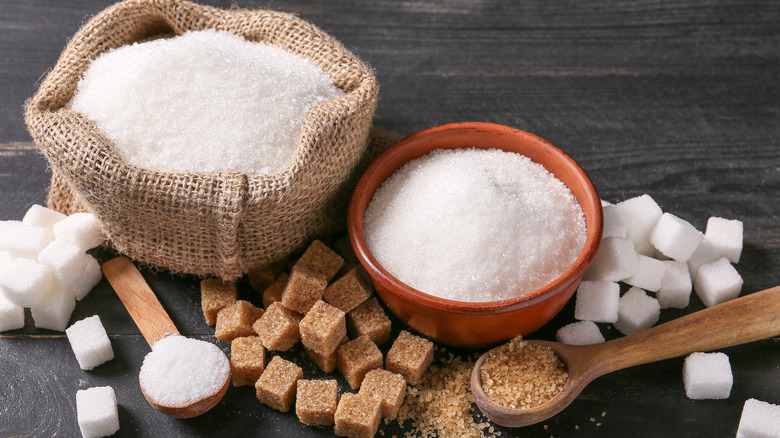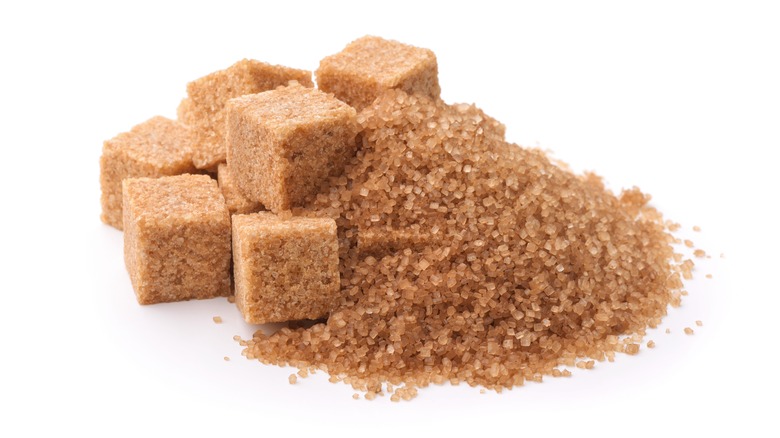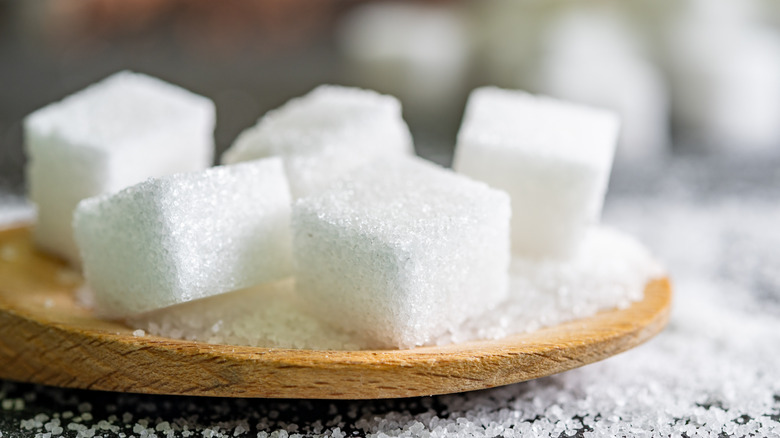What Is The Nutritional Difference Between Brown And White Sugar?
You may stock your pantry with an increasing array of confectioners, demerara, or turbinado sugars, but white and brown sugar will always be the kings. White sugar has that perfect sweet, neutral flavor profile that makes it so versatile, and its refined texture makes it easy to measure out and work with. Brown sugar does much the same job, but brings some caramel complexity to the party, adding depth to all sorts of cookies and pies, including the quintessential brown sugar treat, the chocolate chip cookie.
While they may dominate your baking, white and brown sugar are not completely interchangeable. Brown sugar is just white sugar that still has some molasses in it, either because it was refined less, or because manufacturers added some back in at the end of the process, but that does change its nature a bit. According to Serious Eats, the molasses in brown sugar means it has a higher water content, which is why it can alter the texture of your baked goods if you use it in place of white sugar. This difference also means there are some slight variations in the nutritional profiles of the two.
Brown Sugar has a few more minerals
Nutritionally, both white and brown sugars are a form of sucrose, refined table sugars that Good Housekeeping notes are added to foods and drinks to enhance their flavor. Although they may taste great, they are not that great for you. The Centers for Disease Control recommends you keep your consumption of added sugars below 200 calories a day, the equivalent of about 12 teaspoons. This goes the same for brown sugar, even with the molasses that makes up part of the crystal. Of course, this can be a tough ask right now, considering how much added sugar is in American food.
Notably, brown sugar contains some extra minerals that you won't find in white sugar because of the molasses. The U.S. Department of Agriculture's nutritional profile says brown sugar has about 83 milligrams of calcium, 133 milligrams of potassium, as well as more iron and magnesium. Don't get too excited, however, as those amounts are for 100 grams of brown sugar, or almost double the recommended intake, and the minerals are mere fractions of what you need for a healthy diet. According to the Food & Drug Administration, you should be getting 1,300 milligrams of calcium and 4,700 milligrams of potassium. So even with those extra minerals, brown sugar is simply not a meaningful source of nutrition.
White sugar has no nutritional value
There is a reason you often hear the phrase "empty calories" used in the context of baked goods and sweets. In fact, it is basically the perfect description of white sugar. According to the United States Department of Agriculture, the sugar-refining process strips away what little nutrition was in the substance to begin with, leaving only the tasty and unhealthy parts for consumption. White sugar has about 95% fewer minerals than brown sugar, which means it functionally has none at all. It truly is just pure sucrose.
The bottom line is that if you are worried about nutrition, you should be avoiding excess sugar of all varieties. According to the Sugar Association (via Eating Well), both types of sugar are so nutrient-deficient that the difference is essentially meaningless, and they also have a comparable number of calories, at about 15 per teaspoon serving. Sugar is wonderful, but it does need to stay an occasional treat. Of course, the upside to this is, nutritionally speaking, you don't need to think too much about switching out what type of sugar you are using in your cakes and pastries. You can simply go with whichever one serves the flavor or texture best because the health effects are going to stay the same.


